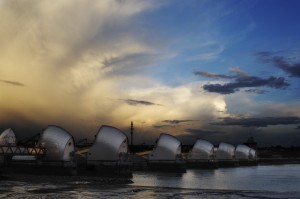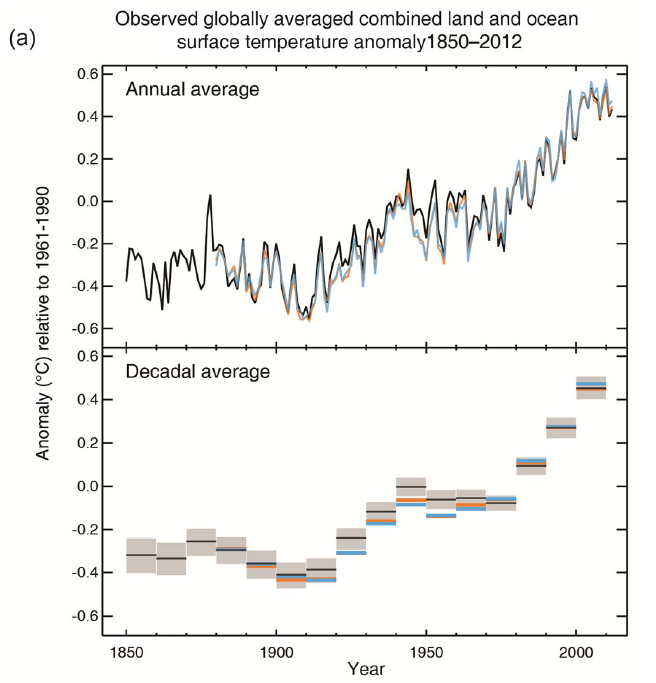A little late starting this month’s open thread – must be the weather…
Climate Science
Exploring CRUTEM4 with Google Earth
Guest commentary by Tim Osborn and Phil Jones
The Climatic Research Unit (CRU) land surface air temperature data set, CRUTEM4, can now be explored using Google Earth. Access is via this portal together with instructions for using it (though it is quite intuitive).
[Read more…] about Exploring CRUTEM4 with Google Earth
New climate science MOOCs
Along with David’s online class a number of new climate science Massive Online Open Courses (MOOCs) are now coming online.
Global temperature 2013
The global temperature data for 2013 are now published. 2010 and 2005 remain the warmest years since records began in the 19th Century. 1998 ranks third in two records, and in the analysis of Cowtan & Way, which interpolates the data-poor region in the Arctic with a better method, 2013 is warmer than 1998 (even though 1998 was a record El Nino year, and 2013 was neutral).
The end of January, when the temperature measurements of the previous year are in, is always the time to take a look at the global temperature trend. (And, as the Guardian noted aptly, also the time where the “climate science denialists feverishly yell […] that global warming stopped in 1998.”) Here is the ranking of the warmest years in the four available data sets of the global near-surface temperatures (1):
|
Rank
|
||||
|
1
|
2010
|
2010
|
2010
|
2010
|
|
2
|
2005
|
2005
|
2005
|
2005
|
|
3
|
2007
|
1998
|
1998
|
2007
|
|
4
|
2002
|
2013
|
2003
|
2009
|
|
5
|
1998
|
2003
|
2006
|
2013
|
If You See Something, Say Something
Gavin provided a thoughtful commentary about the role of scientists as advocates in his RealClimate piece a few weeks ago.
I have weighed in with my own views on the matter in my op-ed today in this Sunday’s New York Times. And, as with Gavin, my own views have been greatly influenced and shaped by our sadly departed friend and colleague, Stephen Schneider. Those who were familiar with Steve will recognize his spirit and legacy in my commentary. A few excerpts are provided below:
Thames Barrier raised again
 Back in 2007 I wrote a post looking at the closures of the Thames Barrier since construction finished in 1983. Since then there has been another 7 years of data* and given that there was a spate of closures last week due to both river and tidal flooding, it seems a good time to revisit the topic.
Back in 2007 I wrote a post looking at the closures of the Thames Barrier since construction finished in 1983. Since then there has been another 7 years of data* and given that there was a spate of closures last week due to both river and tidal flooding, it seems a good time to revisit the topic.
A Bit More Sensitive…
by Michael E. Mann and Gavin Schmidt
This time last year we gave an overview of what different methods of assessing climate sensitivity were giving in the most recent analyses. We discussed the three general methods that can be used:
The first is to focus on a time in the past when the climate was different and in quasi-equilibrium, and estimate the relationship between the relevant forcings and temperature response (paleo-constraints). The second is to find a metric in the present day climate that we think is coupled to the sensitivity and for which we have some empirical data (climatological constraints). Finally, there are constraints based on changes in forcing and response over the recent past (transient constraints).
All three constraints need to be reconciled to get a robust idea what the sensitivity really is.
A new paper using the second ‘climatological’ approach by [cite ref=”Steve Sherwood and colleagues”]10.1038/nature12829[/cite] was just published in Nature and like [cite ref=”Fasullo and Trenberth (2012)”]10.1126/science.1227465[/cite] (discussed here) suggests that models with an equilibrium climate sensitivity (ECS) of less than 3ºC do much worse at fitting the observations than other models.
Unforced Variations: Jan 2014
AGU talk on science and advocacy
We have often discussed issues related to science communication on this site, and the comment threads frequently return to the issue of advocacy, the role of scientists and the notion of responsibility. Some videos from the recent AGU meeting are starting to be uploaded to the AGU Youtube channel and, oddly, the first video of a talk is my Stephen Schneider lecture on what climate scientists should advocate for (though actually, it mostly about how science communicators should think about advocacy in general since the principles are applicable regardless of the subject area):
The global temperature jigsaw
Since 1998 the global temperature has risen more slowly than before. Given the many explanations for colder temperatures discussed in the media and scientific literature (La Niña, heat uptake of the oceans, arctic data gap, etc.) one could jokingly ask why no new ice age is here yet. This fails to recognize, however, that the various ingredients are small and not simply additive. Here is a small overview and attempt to explain how the different pieces of the puzzle fit together.
Figure 1 The global near-surface temperatures (annual values at the top, decadal means at the bottom) in the three standard data sets HadCRUT4 (black), NOAA (orange) and NASA GISS (light blue). Graph: IPCC 2013. [Read more…] about The global temperature jigsaw
